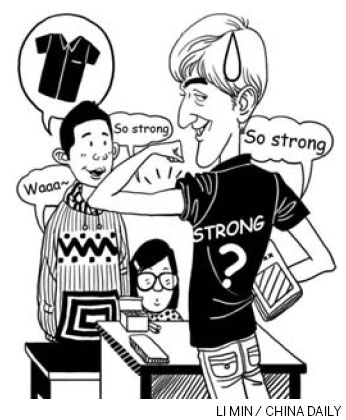There are a lot of things that often happen to me in China which would almost certainly never happen in the United States. One of those things is being called "strong".

The first time was last December. I was walking across the high school campus in Guangzhou where I teach when a student in a gray scarf and familiar blue-and-white track uniform waved hello with her mittened hands. I smiled and waved back, but then she stopped and called my name.
"Hi, Samantha," I called back, impressed with myself for remembering her name. I made a mental note to work on memorizing more of my students' names.
"You're so strong!" she smiled and pointed at what appeared to be my right arm.
I looked down at my arms. Let's get one thing clear: I am a skinny dude. I have occasionally attempted somewhat half-heartedly to change that with exercise and protein powders, but my hyperactive metabolism always wins. Once, while rehearsing for a high school talent show, I was told by the teacher in charge that I couldn't participate in the men's shirtless dance routine because my visible rib cage would frighten the audience.
"I'm so what?"
"You're so strong!" she repeated, still grinning earmuff-to-earmuff.
"Um, thanks!" I didn't know what else to say ("You're so strong, too"?), so we both waved goodbye.
In the locker room of the swimming pool, I examined my right bicep muscle, if you can call it that. Surely there was a misunderstanding here. I folded my arms, trying to recreate the circumstances under which I had been mistaken for muscular. Perhaps with my left hand folded under my right armpit, that muscle bulged, creating sort of a Popeye effect?
Physique-related praise from my students is something I've learned to take with a few heaping handfuls of salt. I've been told on multiple occasions that I look more handsome with a beard: the same sparse, scraggly mess that induces nausea in my American peers, even through a webcam.
So I wasn't exactly ready to jump to any conclusions about my body, though I must admit I was curious as to the real reason for such praise.
The next morning I stepped into my Oral English classroom only to be greeted instantly by a unanimous "Waaa!" of shock and admiration.
"What?" I asked, startled.
"You're so strong!" shouted a boy from the back of the class. Giggling ensued.
"Okay, will someone please tell me what that means?" I had to get to the bottom of this. I turned to the class monitor, gesturing for him to speak.
"We just mean, you look very strong today," he offered earnestly.

"What?! You mean like this?" I curled my arm and flexed like a bodybuilder. More giggling.
"No! But it's so cold today, and you're only wearing a short-sleeved shirt."
Let's get another thing clear. Guangzhou is a subtropical city. Rarely is the temperature anything near what I, or anyone who grew up above the 35th parallel, would call "cold". My native Cantonese students, however, start bundling up as soon as the first pleasant breeze breaks the stifling heat of summer.
"But I always wear short-sleeved shirts! Oh, I get it." My "strength", evidently, had less to do with my muscle mass and more do to with my apparent ignorance of the wind-chill factor.
After two winters in Guangzhou I've been called "strong" enough times to make it part of my Chinese cultural vocabulary. And enough times to not let it go to my head. By which I mean... my biceps.
|
|
|
|
|
|
|
|
